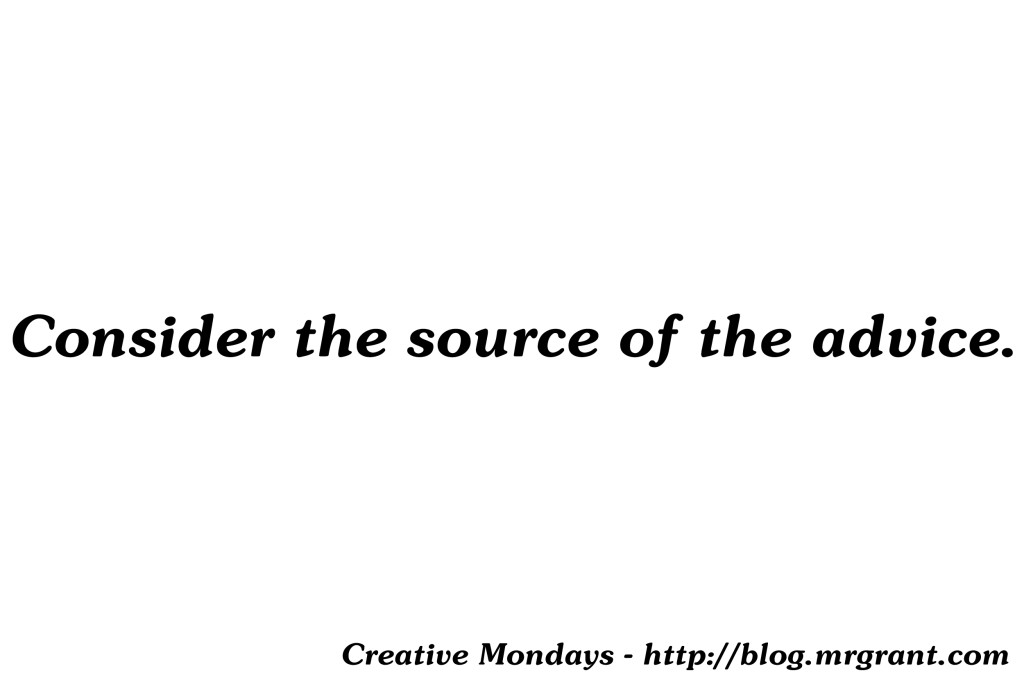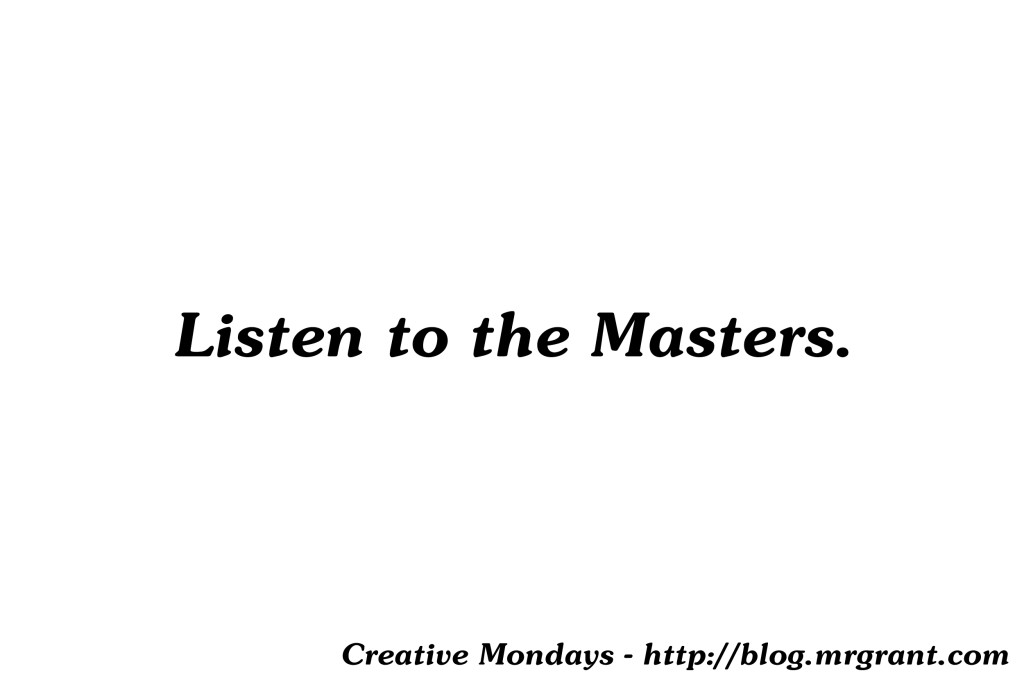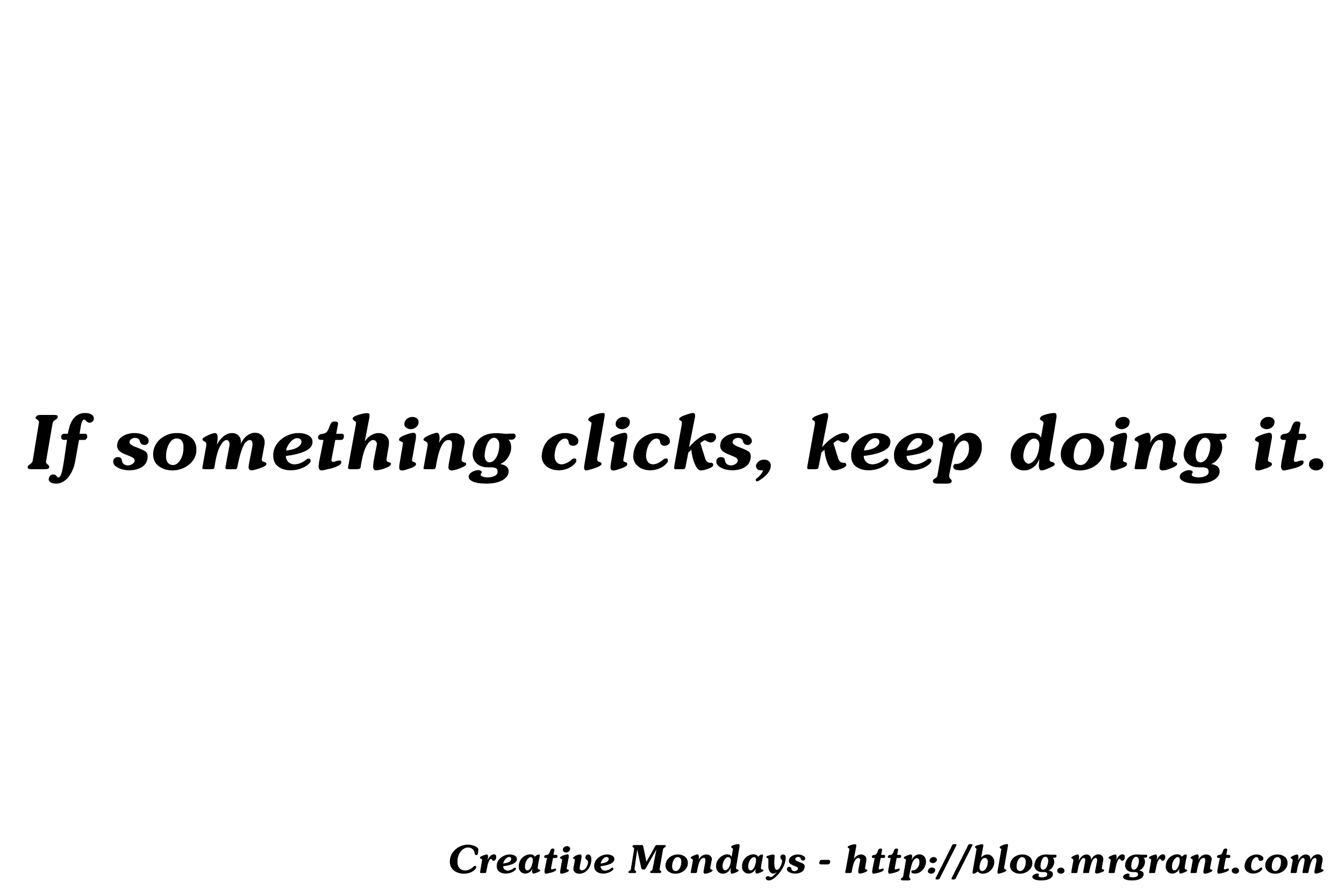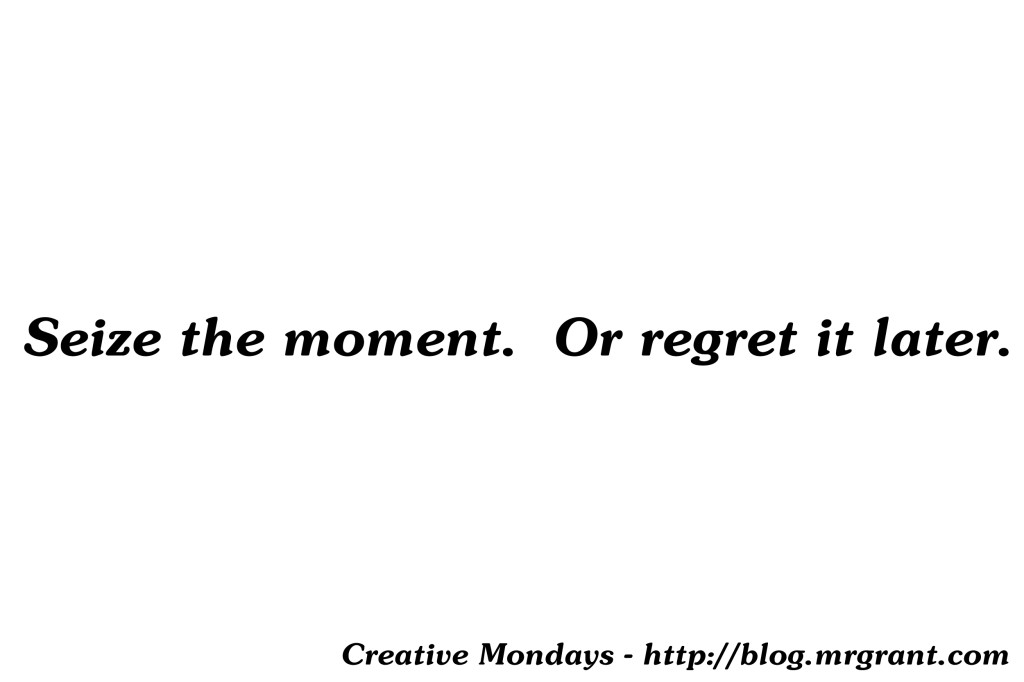Tag: creating
Creative Mondays #013 – Consider the source of the advice.

I talked earlier in this blog about keeping your plans secret. Don’t tell others what you are doing because they will taint your ideas with phrases like, “You know what you should do instead?” But, there are times in your creative career where you will solicit advice from others. That is perfectly fine as long as you keep one thing crystal clear in your head: consider the source.
We started working on Dr. Floyd way back in 1999. It wasn’t a podcast back then, it was a public access TV show. Even though we were limited by the technology of the time, the whole creative world seemed wide open in terms of what we were able to do. While we were working on the show I began cobbling together a script for what, I dreamed someday, would become a Dr. Floyd feature film. Look, it’s Hollywood, everyone has a script in a drawer somewhere.
Before it was finished I gave it to someone to read and this person came back telling me that I didn’t write the script properly. Not in that it was formatted incorrectly, but that I was “being too descriptive in the details” and that I was, “writing out things that should be left up to the director.” Hearing this bummed me out and I never finished the script because I felt I was doing it all wrong.
Years later, I was thinking about that script and about what that person had said and then I realized that the person who gave me that advice had written a script but never had one produced (outside of doing it for himself). So, what right did he have to tell me I was doing something right or wrong when he’s never done it himself? How did he know I was adding details that would be left up to the director?
Consider the source.
If you’re trying to do something and you get advice, consider who is giving you that advice. If you’re trying to publish a book, is the person giving you advice a published author? If you’re trying to get your first art showing, is the person giving you the advice and artist who has had gallery showings before? If you’re writing a script and someone who has never had a script produced is telling you you’re doing it wrong, should you listen to them? No.
Now, the flip side to that is that if the person HAS done what you want to do, listen to their advice.
I wrote a novella a few years ago and a friend of mine, who is a published author, graciously offered to read it. This person then pointed out several things that could be changed to make the novella read better and I took that person’s advice because they had done what I want to do.
Consider the source. Who is giving you this advice? Have the done what you’re trying to do?
In the end, it is up to you to take ANY advice you are given. Whether it be from someone who has done what you’re trying to do or someone who hasn’t. Only take the advice if it feels right for you and what you are working on.
—
Do you consider the source when getting advice? Has someone with no experience in what you are trying to do ever given you advice that derailed you creative goals? How did you deal with it? Let me know in the comments below!
Creative Mondays #012 – Listen to the Masters.

A phrase I’m sure you’ve heard a before is ‘Listen to the Masters.’ Meaning seek out the people who are considered the pinnacles of your chosen field(s) of art and study them. In painting it’s van Gogh, Picasso, Dali and more. In music it’s Beethoven, Mozart or The Beatles if you’re more contemporary. Writing has Hemmingway, Shakespeare, Rowling or King. Screenwriting has Stanley Kubrick, Billy Wilder and Ingmar Bergman to name a few. Acting has Tom Hanks, Meryl Streep, George Clooney. Just Google “Most famous (you shosen field of creative art) and you’ll get list after list. Of course, these lists are all subjective, but you’ll find the top three are usually people everybody knows. These are the Masters.
I think researching the Masters is a very important thing to do in order to see what can be done in your field. The amount of knowledge that can be learned from people who are ‘Masters in your field should not be downplayed at all. I would, however, like to make one small change to the phrase ‘Listen to the Masters.’
I think you should listen to YOUR masters.
I think you should study to the people who inspired you to get up off your rear and start creating. The people who you feel are the pinnacle of your chosen field(s) of creation. The people who inspired you are your Masters and you should study them totally and unapologetically. If someone who inspired you was Hemmingway or Mozart, great. But if who inspired you is or was not a household name, study them. Learn from them.
I’ve said on here time and time again that one of my inspirations is Joel Hodgson, creator of Mystery Science Theatre 3000. As popular as Joel is, when I say his name to people I sometimes get the ‘huh?’ look. When I explain he’s the creator of Mystery Science Theatre 3000, that clears it up for some, but there are still people out there who haven’t heard of that show. And that’s fine. The people you look up to don’t have to be household names. They just have to light a creative fire under you that spurs you on to emulate them. They inspire you to continue creating the art they have shown you.
I just finished the book Steal Like An Artist by Austin Kleon. It’s a great read that I recommend any create person pick up. It’s short and if you have an hour or so, you can probably zoom right through it. In one chapter he talks about creating a family tree for your creative self. This family tree isn’t about blood relations though, it’s about the people who inspired you creatively and made you the creative person you are today. Austin tells you to study the people who directly influenced you and then study the people who influenced them, creating a family tree of creativity.
“Weird Al” Yankovic is a big influence on my comedy, obviously. When I first heard Al’s Eat It, I was hooked. After I’d picked up his album, I noticed that he thanked Dr. Demento on his discs. I, somehow because this was before the internet, found out that Dr. Demento hosted a weekly radio show. I cajoled my parents into recording the show for me every week and it opened a whole new world up to me. Suddenly I was hearing Al’s influences. Allan Sherman, Stan Freberg, Tom Lehrer and Spike Jones. I was creating a creative family tree for my love of comedy music. I was listening to new things that would become true favorites (Stan Freberg, Smothers Brothers) and some that, though I could see the appeal, were not favorites (Frank Zappa). This was all because I followed the creative line from “Weird Al” back.
I think that listening to your Masters, is super important and should be done by every artist. You don’t know where you can go if you don’t look back and see where you have been.
—
Who has inspired your creative life? Have you researched them and seen who influenced their creative life? Let me know in the comments below.
Creative Mondays #011 – If something clicks, keep doing it.

When I began training to be in The Jim Henson Company’s Puppet Up, part of the training was improv classes. After taking those classes for a while, I started taking classes outside of Henson, through The Imrpovatorium. Most of my classes were with Patrick Bristow but I had a few other teachers as well. One class I took was a long form improv class with Ted Michaels. Ted is a brilliant improviser and he is also a member of Puppet Up. Ted is a great teacher and knows a lot of great structures to help drive home the core concepts of improv.
I don’t remember the exact name, but one of the structures we did really hit me as being funny and, as I was thinking back about it today, the principles of it can be applied to creativity. The improv scenes started out just like most other improv scenes. Two people got a suggestion and then began the scene. The rule of this game was to go through the scene as normal until the first big, whole audience, laugh. Then, whatever it was that got that laugh, the two improvisers just keep doing that. The point being that if you keep following that first big laugh, most of the time the scene will continue to be really, really funny. I’ll give you an example.
My friend Chris and another improviser were doing a scene that involved them getting into a car. Once inside the car, Chris made a move to roll down the car’s window. Of course, he was ‘space-working’ or miming it because there wasn’t a car on stage. So Chris made the move to roll down the window but his move was just really weird and not how you would go to roll down a real car window. It was funny because the audience immediately thought, “What kind of crazy wind controls does this car have?” That move got a big laugh.
So Ted said, “Okay, the scene is now about this ‘awkward space-work’ car.”
So Chris and his partner just went on with the dialogue as normal, but everything in the car, turning on the radio, opening the sunroof, pushing in the cigarette lighter, became these really big awkward physical movements. The scene was so funny. As the class continued, time and time again it was proven that if you just kept following that one thing that tickled the audience, the scene will succeed. Of course there were exceptions to the rule, but for for the most part, it worked.
Now, another improv teacher I’ve had would agree to an extent. I believe he would say you should pursue what the audience feels is funny, yes, but be aware when they are ready to move on to something new. Then look for the next thing and follow that.
I think this theory or pursuing what ‘clicks’ with the audience can be applied to creative work as well.
If you find that you create a piece of art that really clicks with your audience, follow it. Keep creating in that manner. Now I’m not saying paint the same painting over and over again, but if you find a style that hits with your audience, keep creating in that style. If you’re a writer and a story or book hits, write another with the same characters or in the same universe. If a sculpture you create is a hit, create in the same style for the next one. Follow what clicks with your audience. I’m also not saying never create in another way again, that would be boring. But if you find something that works, go with it until it doesn’t work anymore and then try something else.
I can point to an example of this in The Radio Adventures of Dr. Floyd. In 6 seasons of the show we followed the same ‘time travel’ formula. Dr. Steve wanted to steal historical artifacts and Dr. Floyd tried to stop them. After six seasons I wanted to try something else. Shake up that formula a little. So I created a season long storyline where Dr. Floyd and Dr. Steve got trapped inside classic literature. Now, I think these were some of our most fun shows and showed that the Dr. Floyd characters could still exist in another format. Some in the audience didn’t think so. While many folks loved Season 7, we got plenty of feedback from folks who missed the time travel formula we had done over the previous seasons. So, you’d better believe we brought it back for what was the eight and final season.
Dr. Floyd really clicked with people and I followed it until it was impossible to do so anymore due to issues that arose between myself and the other co-creator of the characters. Since then, I’ve created other similar style projects and some of that audience stayed with me. True, many want Dr. Floyd to return, but that’s just not possible now. But those who like the way I produced audio drama have followed and, I hope, they aren’t disappointed as I’m still creating in the same style. I’ve set up Saturday Morning Theatre as sort of a testing ground where I can produce different types of shows and if one of those shows really clicks, I can run with it and produce more. The Tales Deputy Guppy seems to have a pretty good fan base, so there will definitely be more episodes of that. The Adventures of The Thunder Crester got sort of a lukewarm response, so I may make a few more episodes to wrap up the storyline, but I probably won’t be producing more seasons of it.
If something clicks with your audience, keep doing it.
—
Have you ever had something click with your audience? If so, what did you do? Did you follow it or try something different? Let me know in the comments below.
Creative Mondays #009 – Seize the moment. Or regret it later.

When I first thought about the topic for today’s post, I figured this would only work for those who are in the performing side of the creative arts world. But the more I thought about it, the more I feel it applies to everyone in the art world and, heck, everyone in general. Again, it’s a saying we have all heard a million times, but it bears repeating:
Seize the moment. Or regret it later.
This has rumbled back around in my brain this past week because I failed to seize a moment presented to me this past week and I’m totally regretting it now. Let my tale be a lesson to you all.
As you may or may not know, I am a ringside interviewer for Championship Wrestling from Hollywood. It is a totally fun job with a great group of people and last Sunday (February 23) I worked the latest round of TV Tapings for the show.
Before the show I found out that we would only have one permanent commentator for the day, the fantastic Johnny LaQuasto. He would be joined periodically on commentary by manager Stu Stone, but for the most part, he would be on his own. During the tapings, I sit next to the commentators table to ring the bell for the start and finish of each match and to be able to hop down to ringside to conduct the interviews. So I’m very close to the ‘action.’
Before we started the show, Stu Stone took me aside and said, “Listen, I have to be ringside for a lot of the matches and LaQuasto will be on his own. Hop on to commentary when I’m not there.” I nodded and said, “Okay.”
Now, I have never done commentary before. I had thought about it, yes, but never have I stepped up to the mic to actually call a match. My brain started tumbling with thoughts, “Yeah, you should totally do it. But what if I suck? Well, then they’ll never have you do it again, but you aren’t going to kill anyone by doing it. But I know I will suck.” The old negative brain hard at work.
The show started and Johnny and Stu were on commentary and soon Stu was off to head to ringside. I put on the extra headset (earphones and a mic) and sat there and…I didn’t say anything. Not that I was prompted to, Johnny was doing just fine solo. But in my head I felt, “I don’t really have the okay from someone in charge to do this so I’m not going to say anything. Plus, I’ve never done it so I’ll probably be bad at it.”
At one point during a match, Stu came past the table while running around the ring and yelled at me, “Why aren’t you saying anything?!” I laughed, but deep down I knew he was right. I should just start talking. Stu Stone is one of the best managers working the ‘indy’ wrestling world today. He got to that position by seizing EVERY opportunity that came his way.
So I sat there, pretty much the whole taping, with the headset on and I didn’t say a word. Because my brain was telling me that I’d be bad at it and I had this fear that I would ‘get in trouble.’
Days after I’m still regretting that decision for several reasons. First of all, I wouldn’t have been ‘bad’ at doing commentary during the match. I wouldn’t have been the next coming of Jim Ross by a long shot, but I wouldn’t have been as ‘bad’ as my brain had me convinced. I’m a strong improviser, I’ve been watching wrestling since 4th grade and I know all the guys in the ring. I could have done it. And, besides, if my commentary had been REALLY bad, I would have realized and I could have just dropped out at the end of the current match and not done it again. No biggie.
Secondly, I wouldn’t have ‘gotten in trouble.’ I wouldn’t have been fired or drummed out of wrestling. The worst case scenario is that Dave Marquez, our director and executive producer, would have just told me not to do it again. But again, knowing Dave, that would have only been if I would have been miserably bad, which we already have stated I wouldn’t have been. Had I seized the chance and it had been halfway decent, it would have shown to Dave and the other producers of the show that there is another place I can be plugged in during the shows.
I should have seized the opportunity. Now I just regret it.
Don’t let this happen to you. If you get the opportunity, seize it. Or regret it later.
—
Okay, let’s hear about the opportunities you failed to grab hold of. Why didn’t you jump? What did you learn from not seizing the chance to do something?